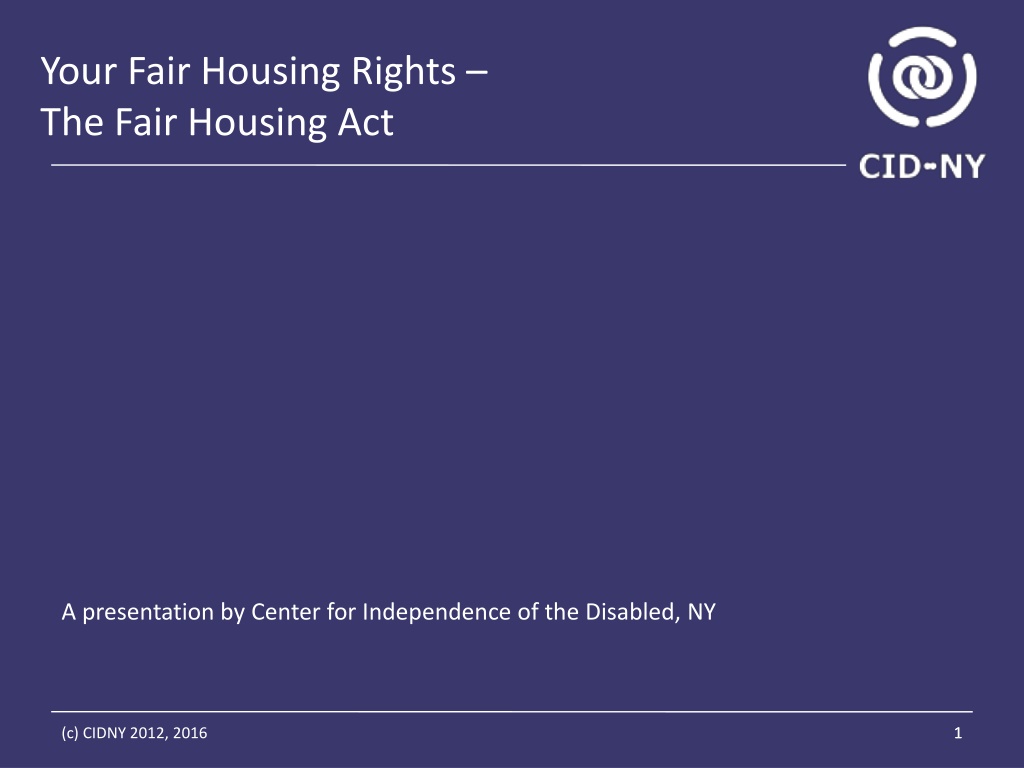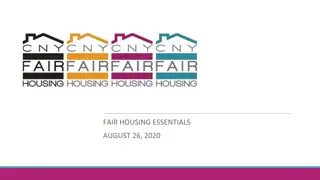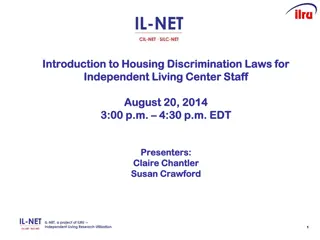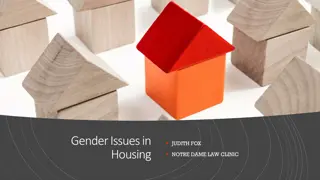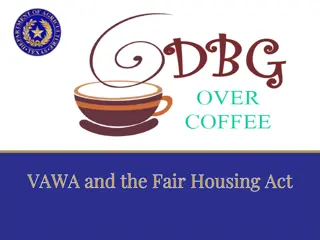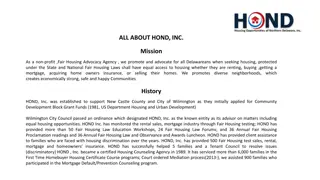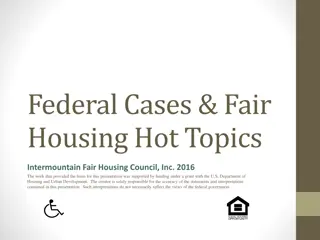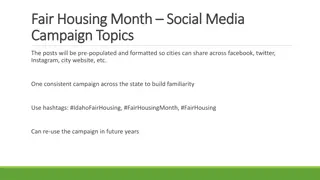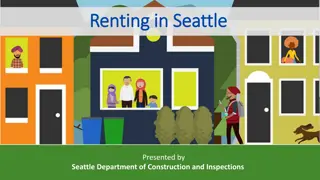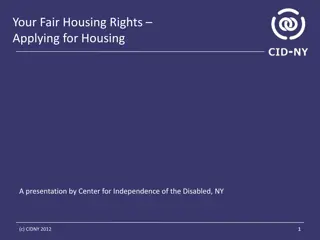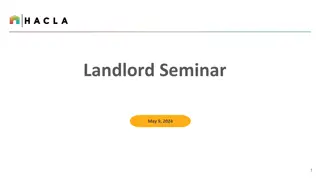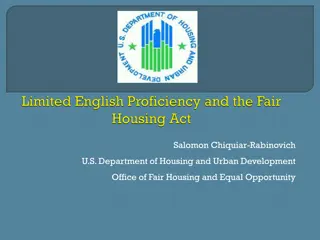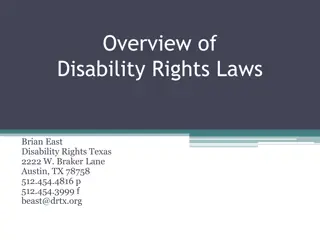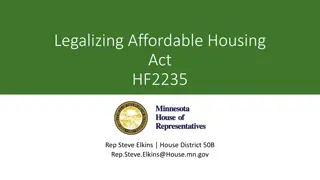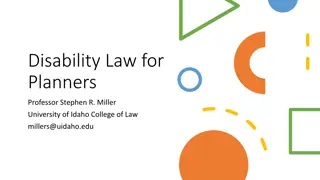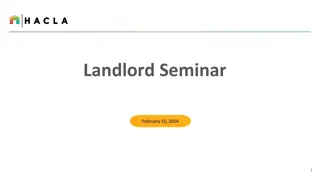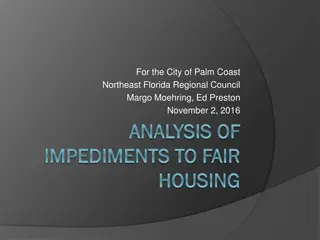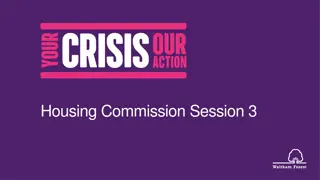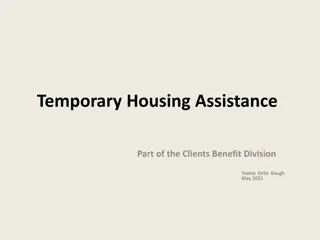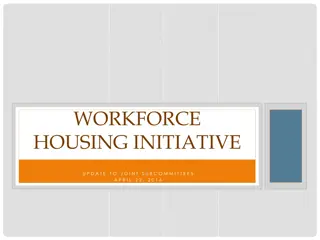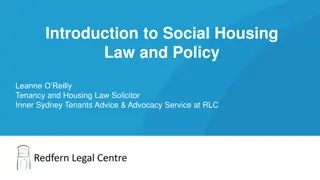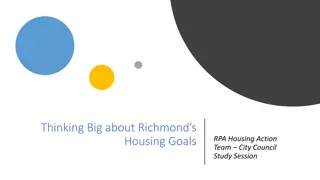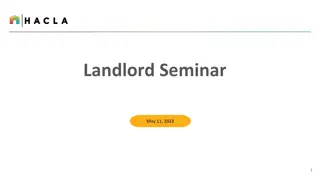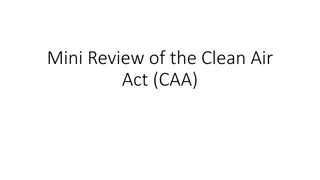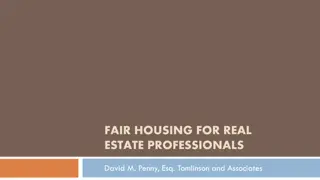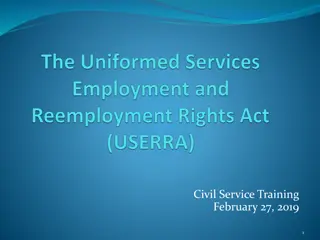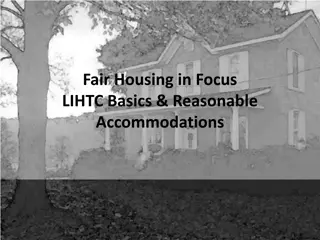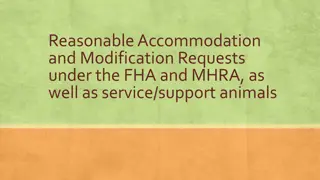Fair Housing Act: Rights, Protections, and Coverage Explained
The Fair Housing Act safeguards the rights of individuals with disabilities to fair housing access. It prohibits discrimination based on disability status in renting or buying homes. The Act covers various types of housing but excludes certain exemptions. It protects the rights of individuals to request accommodations, make modifications, and be treated fairly without harassment due to disabilities.
Download Presentation

Please find below an Image/Link to download the presentation.
The content on the website is provided AS IS for your information and personal use only. It may not be sold, licensed, or shared on other websites without obtaining consent from the author. Download presentation by click this link. If you encounter any issues during the download, it is possible that the publisher has removed the file from their server.
E N D
Presentation Transcript
Your Fair Housing Rights The Fair Housing Act A presentation by Center for Independence of the Disabled, NY (c) CIDNY 2012, 2016 1 1
What is the Fair Housing Act? The Fair Housing Act protects the rights of certain groups of people including people with disabilities, people with a history of having disabilities, and people who are believed to have disabilities to fair access to and enjoyment of housing. Under the Fair Housing Act, a disability is a physical or mental impairment that substantially limits a major life activity. Major life activities are activities of central importance to daily life, like seeing, hearing, walking, breathing, performing manual tasks, caring for one s self, learning and speaking. You may be protected under the Fair Housing Act even if you do not qualify to receive Social Security disability income. (c) CIDNY 2012, 2016 2
Who is Protected by the Fair Housing Act? People who are applying to rent housing, are renting housing, or are buying a home, and Have, have had, or are regarded as having a disability. You cannot be denied housing or treated differently from other tenants or applicants because: You have a disability You had a disability in the past Someone thinks you have a disability (c) CIDNY 2012, 2016 3
What Homes Are Covered by the Fair Housing Act? Almost ALL privately owned, public, and publicly subsidized housing, except: Homes owned by landlords that own three or fewer homes and are sold/rented without discriminatory advertising or through a real estate agent Homes with four or fewer units, if the owner lives in one of the units Homes owned by private clubs or religious organizations that only allow members to live there (c) CIDNY 2012, 2016 4
What Rights Are Protected by the Fair Housing Act? You right to rent or buy a home Your right to request and receive reasonable accommodations to rules, policies, and procedures that could prevent you from applying for, living in, or enjoying a home because of your disability Your right to make reasonable modifications to features of a home that could otherwise prevent you from using or enjoying it because of your disability Your right to be treated fairly and not subjected to harassment or different terms, conditions, or privileges because of your disability (c) CIDNY 2012, 2016 5
Your Fair Housing Rights Applying for Housing A presentation by Center for Independence of the Disabled, NY (c) CIDNY 2012, 2016 6 6
Meeting the Landlord Often, before you rent a home, you will need to meet with the home s owner or someone who works for the home s owner A reasonable accommodation is a change in rules, policies, or services so that a person with a disability will have an equal opportunity to use and enjoy a home. If your disability prevents you from meeting at the property, you may request a reasonable accommodation. For instance, you may request to meet elsewhere or to communicate by phone. (c) CIDNY 2012, 2016 7
Meeting the Landlord The Fair Housing Act prohibits a landlord from asking you certain questions. A landlord CANNOT ask you about your disability, unless: You are applying for housing only open to persons with certain disabilities, or You are asking for a reasonable accommodation A landlord should NEVER: Ask for your medical records Require you to prove that or ask whether you can live independently (c) CIDNY 2012, 2016 8
Meeting the Landlord Examples of questions a landlord generally CANNOT ask: Do you have a disability? How serious is your disability? Have you ever been hospitalized because of a disability? Can I see your medical records? What medications do you take? How often do you see a doctor? Are you able to live by yourself? Have ever been treated for substance abuse? (c) CIDNY 2012, 2016 9
Meeting the Landlord A landlord CAN: Request financial information to determine whether you can pay the rent Request references about your history as a tenant Ask whether you are willing to comply with building rules Ask whether you are currently using drugs Ask about criminal history, including convictions for the manufacture or distribution of a controlled substance A landlord CANNOT ask you a question that he/she does not ask all other potential tenants. or to allow a cosigner to compensate for poor You may request a reasonable accommodation to comply with these requests. For instance, you may ask your landlord to accept a reference from a group home instead of landlord references, credit history (c) CIDNY 2012, 2016 10
Completing the Rental Application You may also need to complete a rental application. If you cannot complete the application because of your disability, you may request a reasonable accommodation. For instance, you may request that the application be read to you instead of provided only in written format, or that the application be mailed to you if you cannot pick it up in person. The rental application should NOT seek information about disability, medical history, or ability to live independently. (c) CIDNY 2012, 2016 11
Requesting An Accommodation Consider whether, because of your disability, you will need an accommodation to live in the home you wish to rent. For example, if required to make housing usable because of your disability, you could request: Reserved parking Waiver of guest/parking fees for home health aide Oral reminders to pay rent Waiver of no pets policy A particular apartment location (e.g., lower floor, quieter area) While you can request these accommodations, a landlord CANNOT force you to accept any accommodation you do not want (c) CIDNY 2012, 2016 12
Requesting An Accommodation A landlord does not need to grant an accommodation if it poses an undue burden or requires a fundamental alteration of operations. For example: It would not create an undue burden to request that a landlord accept rent a few days late because you must wait for your Social Security check, or by mail instead of in person. But it would create an undue burden to ask a landlord to forgo rent altogether. It would not require a fundamental alteration for a landlord to allow a live-in caregiver or a service animal in a unit. But it would require afundamental alteration for a landlord to pay the caregiver or care for the service animal. (c) CIDNY 2012, 2016 13
Requesting An Accommodation You can discuss accommodations with a landlord during the application process, but you should request any needed accommodations in writing if possible so that you can prove you made the request. It is your responsibility to request accommodations. Your request should state that you have a disability and explain, as specifically as possible, why the requested accommodation would be helpful. A landlord CAN request proof that you have a disability and need the requested accommodation. But you do NOT need to give a landlord the specifics of your disability or a full medical history. (c) CIDNY 2012, 2016 14
Requesting a Modification Also consider whether you will need to make reasonable modifications physical changes to the home you wish to rent because of your disability. Generally, you will need to pay for these physical changes. You may also be required to undo physical changes when you stop renting the home. You should request any needed modifications in writing if possible. Once you and the landlord have agreed on modifications, confirm your agreement in writing. (c) CIDNY 2012, 2016 15
Requesting a Modification Also consider whether you will need to make reasonable modifications physical changes to the home you wish to rent because of your disability. Generally, you will need to pay for these physical changes. You may also be required to undo physical changes when you stop renting the home. You should request any needed modifications in writing if possible. Once you and the landlord have agreed on modifications, confirm your agreement in writing. (c) CIDNY 2012, 2016 16
Requesting a Modification Also consider whether you will need to make reasonable modifications physical changes to the home you wish to rent because of your disability. Generally, you will need to pay for these physical changes. You may also be required to undo physical changes when you stop renting the home. You should request any needed modifications in writing if possible. Once you and the landlord have agreed on modifications, confirm your agreement in writing. (c) CIDNY 2012, 2016 17
The Fair Housing Act Recognizing Discrimination (c) CIDNY 2012, 2016 18
How to Recognize Discrimination Discrimination occurs if your request for housing is rejected because of your disability. Landlords CANNOT refuse to rent because of your disability unless you cannot meet obligations that apply to all tenants. (c) CIDNY 2012, 2016 19
How to Recognize Discrimination Landlords CANNOT refuse to rent because of your disability unless you cannot meet obligations that apply to all tenants. BUT: If a reasonable accommodation would let you meet general obligations, a landlord can t reject your application because you can t comply with those obligations. A landlord s conclusion that you cannot meet obligations must be based on recent, credible evidence. Your landlord must consider any evidence that past failures to meet obligations were related to your disability and are not likely to be repeated. For instance, if your disability prevents you from delivering rent in person, your landlord must allow you to deliver rent by mail. (c) CIDNY 2012, 2016 20
How to Recognize Discrimination Landlords can refuse to rent because of your disability if you present a direct threat to the health or safety of others or substantial damage to the property of others would occur. BUT: A landlord s conclusion that you pose a threat to persons or property must be based on recent, credible evidence. If a reasonable accommodation would let you eliminate the threat, a landlord can t reject your application based on the threat. Your landlord must consider any evidence that past conduct was related to your disability and is not likely to be repeated. (c) CIDNY 2012, 2016 21
How to Recognize Discrimination It is discrimination if a landlord refuses to offer you the same rental agreement offered to other tenants. A landlord CANNOT charge you extra money or include extra requirements in your lease because of your disability. For example: You may NOT be required to pay an extra security deposit because you use a wheelchair. A landlord may NOT require you to have a caretaker live with you. A landlord may NOT require you to sign more or broader liability waivers than are required of other tenants. (c) CIDNY 2012, 2016 22
Summary of Discriminatory Acts A landlord refuses to offer you the same rental agreement offered to other tenants. A landlord charges you extra money or include extra requirements in your lease because of your disability. A landlord asks questions about your disability and/or medical condition. A landlord refuses your request for a reasonable accommodation or modification. (c) CIDNY 2012, 2016 23
For More Information Contact: ESTER BENJAMIN, Olmstead Housing Specialist at 917-476-6836 ebenjamin@cidny.org ZOLA MENDOZA Olmstead Housing Specialist at 917-443-7731 zmendoza@cidny.org CIDNY 841 Broadway, Ste. 301 New York, NY 10003 (c) CIDNY 2012, 2016 24
Your Fair Housing Rights How to Challenge Discrimination A presentation by Center for Independence of the Disabled, NY (c) CIDNY 2012, 2016 25 25
Options for Challenging Fair Housing Act Violations Use your landlord s internal grievance procedures File an administrative complaint with HUD. File a lawsuit in federal civil court Contact the NYC Commission on Human Rights and the NYC Department of Housing Preservation and Development. Contact the Department of Justice Use the Fair Housing Act requirements as a defense to an eviction proceeding Seek out a pro bono attorney (c) CIDNY 2012, 2016 26
Filing a Complaint with HUD Go to http://portal.hud.gov/hudportal/HUD Contact your nearest HUD Fair Housing and Equal Opportunity (FHEO) field office or use HUD s toll-free complaint hotline: 1-800-669-9777; TDD 1-800-927-9275 Request HUD Form 903.1, a housing discrimination information form Complete the form as clearly and fully as possible Include all relevant dates Explain what happened to you that you believe to be discriminatory and why (c) CIDNY 2012, 2016 27
Filing a Complaint with HUD Consider seeking a lawyer or advocate for help (see Resources slide) Keep copies of the form and all related documentation You MUST file your complaint within one year of the discrimination HUD should investigate your complaint within 100 days HUD may forward your complaint to a state or local office for investigation HUD may try to negotiate an agreement between you and the landlord (c) CIDNY 2012, 2016 28
Filing a Complaint with HUD If no agreement is reached between you and the landlord, HUD will issue a final report on whether there is reasonable cause to believe discrimination occurred If HUD concludes that there is reasonable cause, it will issue a charge of discrimination Once the charge of discrimination is issued, either you or the landlord can move the case to federal court within 20 days If the case goes to court, you will be represented by the Department of Justice If the case does not go to court, it will be heard before an administrative judge within 120 days HUD attorneys will represent you (c) CIDNY 2012, 2016 29
Filing a Lawsuit in Federal Court Instead of filing a complaint with HUD, you may choose to file a lawsuit directly in federal court You must file your complaint within two years of the discrimination If you choose to file a lawsuit, it is best to be represented by a lawyer If you cannot afford a lawyer, the judge may but is not required to appoint a lawyer to represent you You may be able to find a lawyer who will take your case without advance payment (see Resources section) If your claim is successful, the defendant may have to pay your attorney s fees (c) CIDNY 2012, 2016 30
Tips for Success Document, document, document! Whenever possible, put communications with your landlord in writing Ask that your landlord put communications to you in writing Make notes about any conversations with your landlord, including time and date Save relevant documents, like rental agreements and rental applications Don t wait too long to complain Seek guidance from a lawyer or other advocate (c) CIDNY 2012, 2016 31
Resources Center for Independence of the Disabled, NY (CIDNY - Queens) 80-02 Kew Gardens Road, Suite 107 Kew Gardens, NY 11415 646-442-4153 Urban Justice Center 123 William Street New York, NY 10038 212-602-5600 Association of the Bar of the City of New York Legal Referral Service Hotline 212-626-7373 http://www.abcny.org Fair Housing Justice Center 5 Hanover Square, 17th Floor New York, NY 10004 212-400-8203 Long Island Housing Services, Inc. 640 Johnson Ave, #8 Bohemia, NY 11716 631-567-5111 (Suffolk); 516-292-0400 (Nassau) Housing Works Legal Services 320 West 13th Street New York, NY 10014 212-645-8111 (c) CIDNY 2012, 2016 32
